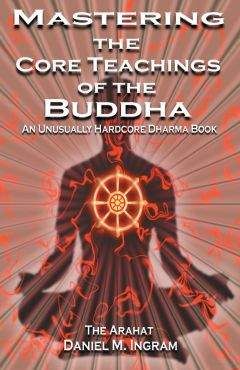Daniel Ingram - Mastering the Core Teachings of Buddha - An Unusually Hardcore Dharma Book
На электронном книжном портале my-library.info можно читать бесплатно книги онлайн без регистрации, в том числе Daniel Ingram - Mastering the Core Teachings of Buddha - An Unusually Hardcore Dharma Book. Жанр: Прочее издательство -, год 2004. В онлайн доступе вы получите полную версию книги с кратким содержанием для ознакомления, сможете читать аннотацию к книге (предисловие), увидеть рецензии тех, кто произведение уже прочитал и их экспертное мнение о прочитанном.
Кроме того, в библиотеке онлайн my-library.info вы найдете много новинок, которые заслуживают вашего внимания.

Daniel Ingram - Mastering the Core Teachings of Buddha - An Unusually Hardcore Dharma Book краткое содержание
Mastering the Core Teachings of Buddha - An Unusually Hardcore Dharma Book читать онлайн бесплатно
THE FOURTH JHANA
As before, if the student wishes to go on to the fourth jhana, then they just cultivate the third jhana and begin to pay attention to the fact that even the bodily bliss is somewhat irritating or noisy. Eventually, the mind will abandon the third jhana and shift into the fourth jhana, which is the height of equanimity. This state is remarkable in its simple spaciousness and acceptance. The extreme level of imperturbability would be astounding if there was not such pronounced imperturbability.
This is by far the most restful of the first four jhanas.
The focus of attention is now largely panoramic and thus even saying “focus” here is a bit problematic. In the first jhana the object was finally clear but static and solid that we can stay with. In the second jhana the object begins showing itself and some simple motion is allowed. In the third jhana we go from a spot of attention to a wide circle of attention and the motion gets more complex, so we now have two spatial dimensions and time. In the fourth jhana things get three-dimensional and mind-made objects such as visualizations take on a life 143
The Concentration States (Samatha Jhanas)
of their own, becoming living, luminous and transparent. The fourth jhana includes space and awareness in a way that the previous three do not. Mindfulness is considered to be perfected due to equanimity, though this factor does not stand out as in the third jhana. When we are really in this state, the basic sense we have of where our body is and what it looks like can get very vague or even vanish entirely, though this is less true if we are in this state with our eyes open.
This is quite a high attainment, and can easily be confused with the goal of the spiritual life, though it very much isn’t. From this state the student has quite a number of options. They can get stuck, they can move on to the formless realms, they can cultivate what are described as
“psychic powers,” or they can investigate this state and begin the progress of insight. When investigating this state, special attention must absolutely be given to the fact that the myriad sensations that make up equanimity and spaciousness come and go moment to moment, do not satisfy or provide a permanent resting place, and are not self.
Again, it is easy to get attached to the sensations that make up these high states, and so great precision and attention (as well as honesty) must be given to this if the student chooses this option. Another alternative is to leave this state and then begin insight practice, as the qualities that this state writes on the mind linger for a short time, and this can be helpful if the student does not cling to these benefits.
THE “PSYCHIC POWERS”
As to the “psychic powers” (“siddhis” in Pali), the texts list all kinds of special abilities that may be cultivated using the fourth jhana (or perhaps lower or higher jhanas) as a base, and these are attained today.
These may include all kinds of strange experiences, including full blown and extremely realistic experiences of other realms that can seem quite magical and fall quite in line with what one might think of when one thinks of various “psychic powers.”
Whether or not these are “real” is a question that I am happy to avoid, though these experiences can be so extremely vivid that they can seem more “real” than the “real world.” Much more interesting than the question of what is real is the question of what is causal, i.e. what leads to what. For example, we might decide that our dreams are not
“real”, but we must admit that there are real world consequences of 144
The Concentration States (Samatha Jhanas)
having dreams. All this can be a slippery business, and the “psychic powers” generally don’t turn out to be quite what they seem. As one of my friends once said, “Yeah, I can fly, but just not in this realm!” Buyer beware, or proceed with care.
On the other hand, it does seem to be possible through powerful intent, strong concentration ability, appreciation of interdependence and careful experimentation to manipulate what we might call “this world”, as well as those in it, in very unusual and profound ways. Yes, I am referring to such things as telekinesis, mind control, reading other peoples thoughts, pyromancy, and all of that. The more you get your concentration and insight trips together and the more you look into the magical aspect of things, the more you will learn about what I will call the magical laws of the universe and how to use your will to manipulate it.
However, if you don’t have your morality trip really together, and perhaps even if you do, I would be quite cautious about formally and consciously tapping into that sort of power. It is absolutely vital to remember that you will reap what you sow and that like leads to like when considering the formal use of such power. Kind intention is absolutely essential, but even this is often not enough to keep us from screwing up when we give into the temptation to formally manipulate the world in unusual ways. Power corrupts, as the old adage goes.
Spiritual traditions across the board have a clear love/hate relationship to the powers, and if you begin playing around with them you will come to understand why. The stories of the Buddha
demonstrate clearly that he and those around him simultaneously found them extremely fascinating, occasionally useful, and often profound.
They also found them dangerous, a sidetrack and abhorrent. Just as with any powerful energy, such as sexual energy, the powers tend to reveal our true colors, as it were.
When playing around with the powers, I recommend careful
attention to how we define “real” and the practical implications of our personal definition of “real” for our daily life. For instance, you might have just come back from a retreat where you were playing around with visualization abilities, and a few days later see a troop of radiant angels 145
The Concentration States (Samatha Jhanas)
floating through the walls and into your living room where you are entertaining guests. This was your actual experience.
Whether you choose to ignore them, give them lots of attention, mention them to your guests, get down on your knees and begin praying, or run screaming out the door will have different implications for your actual life. These implications should be carefully considered when conducting yourself in the face of such experiences. On a side note, if you have learned to see angels, you will probably run into devils soon enough.
As to the more manipulative powers, you might begin to get the sense that you can read the thoughts and emotions of others. Do you want to tell them this, or even act on these intuitive feelings on the assumption that they are correct? You might get the sense that you can manipulate the emotions or energetic states of others in ways that would be considered magical. Is this a good idea? There are no easy answers to some of the ethical and practical questions that can arise from the powers, but I would advise a high level of caution and restraint. Respect other’s rights and remember that actions done for other than compassionate reasons are likely to cause an ugly backlash.
The experiences of the “psychic powers” can be infinitely
fascinating, as anything you can imagine experiencing is possible. The powers can also lead to people getting really, really weird. If you want to get to know about your shadow side, this is one way to have a crash course. For instance, it might be very educational to have your relationship issues with your parents manifest as two large, slobbering demons who hurl flaming stuffed animals at you while you are traveling out of your body to the Grand Canyon, but it can often take lots of time and reflection to figure out how these sorts of experiences make a practical difference in our lives.
As one Burmese man once said to a friend of mine, “My brother does concentration practice. You know, sometimes they go a little mad!” He was talking about what can sometimes happen when people get into “psychic powers.” Remember, most of these experiences are sufficient grounds for a diagnosis of mental illness in the conventional medical world, particularly if they begin to interfere with love and work, so seek the guidance of those who simultaneously appear to be quite 146
The Concentration States (Samatha Jhanas)
sane and functional who also know how to navigate skillfully in this territory. Finding these sorts of people is difficult but well worth the effort.
Also, playing around with visions and other extrasensory
experiences, such as traveling out of body, bilocation, etc., can sometimes cause one to feel ungrounded, disconnected, otherworldly and scattered for hours or even days afterwards, something I call a “
siddhi hangover.” Exercise and focusing on anything physical can help, as can heavy foods, orgasms and simply not practicing for a while.
Very strong insight practices with a focus on impermanence can also help to break up these experiences but are not particularly grounding in and of themselves and may often be otherwise. Strongly stated resolutions to not experience or use the powers can also be very helpful, such as simply saying out loud, “I formally resolve that I will not experience or use these powers (name them here) until I formally resolve otherwise.”
I would suggest care and caution in dealing with all the visions and other supernormal or paranormal experiences which might arise in practice. The primary danger is taking them too seriously and thus assuming that they are more important than they really are. It may be a good idea to leave them until very late in one’s practice unless one has someone around to guide them through their skillful use or unless one is fairly balanced and has a good sense of humor about them. If not, they can very easily become further tools of our defilements, long psychedelic and manipulative tunnels to nowhere or destruction.
I remember a letter I received from a friend who was supposed to be on an intensive insight meditation retreat but had slipped into playing with these sorts of experiences. He was now fascinated by his ability to see spirit animals and other supernormal beings and was having regular conversations with some sort of low-level god that kept telling him that he was making excellent progress in his insight practice, i.e. exactly what he wanted to hear. However, the fact that he was having stable visionary experiences and was buying into their content made it abundantly clear that he wasn’t doing insight practices at all, but was lost in and being fooled by these siddhis. You get the picture. Now, don’t get me wrong.
If one is looking for another way to address one’s content and stuff, 147
The Concentration States (Samatha Jhanas)
visions of things like spirit animals can be very helpful. The trick is not to mix up content and fundamental insight.
“Psychic powers” can be used skillfully as well, and there are whole traditions that use them as their primary path. They can significantly broaden one’s horizons and are so interesting that great depths of profoundly steady concentration can easily be developed. They can increase the intensity of our “mental” processes to such a high level that they become very easy to see as they are, should we choose to do so.
They can also begin to blur the line between the “mental” and the
“physical” in ways that can be both disorienting and profound.
When we start playing around with intentions, extended sensate realities and energetic phenomena, it can seem as if there are two worlds or fields of experience that interpenetrate each other, the ordinary one (“the real world”) and the magical one (“second attention,” “astral plane,” “spirit world,” etc.). Integrating these two perspectives into one causal field without artificial dualities or boundaries is quite a project, one with the potential to lead to very high levels of realization or to madness. It is the high-stakes way to play the game, but unfortunately seems to be largely unavoidable past a certain point.
The experiences of the powers can help people live in the world in a way that is at once appreciative of its richness and yet not overly serious about it or fixated on it. At their best, they can serve as a basis for a very deep exploration of sides of ourselves that we rarely see with such clarity, particularly the territory detailed by the likes of Jung and the Shamanic traditions. Occasionally, such experiences can bring profound epiphanies, times when we see our issues and shadow sides so clearly that our lives are definitely transformed for the better.
While this next point might sound a bit radical, there are good reasons to assume that we are all acting at what might be considered a magical level all the time and just doing it with little awareness of that fact. The best argument I know of for learning how to work at the level of the powers is to bring consciousness and compassion to a process that is happening already. Said another way, as we are already casting spells all the time, actually any time there is awareness and intent, we might as well learn to do it well.
148
The Concentration States (Samatha Jhanas)
On the other hand, playing around with siddhis can bring up really screwed up stuff from our subconscious that we are just not ready or able handle skillfully, causing “siddhi bleedthrough” into our lives that is simply unhelpful and very hard to integrate. Actually, when playing around with any meditative technology, there is no free lunch. You always end up being forced to face some further challenge having to do with personal or spiritual growth, either then or shortly thereafter.
There doesn’t seem to be any getting around this.
If you want to cultivate the siddhis, one must generally attain very
“hard” jhanaic states with the specifically intention to attain these experiences, though they can and often do arise spontaneously as well.
The
Visuddhimagga and The
Vimuttimagga (less encyclopedic and
harder to find but much more readable) both spell out how to attain
“psychic powers” in great depth and detail. You could also check out Bhante Gunaratana’s excellent work, The Path of Serenity and Insight.
Simply follow the directions and explore, as they are as accurate it gets.
One should also see Sutta #2, The Fruits of the Homeless Life, in The Long Discourses of the Buddha, for more information on all of the concentration states and psychic powers.
While magical or mythical thinking is generally very unhelpful on the spiritual path, it must be admitted that it is the only kind of thinking that can make much sense of these sorts of experiences. However, know when to turn it on and when to shut it off. If you are doing Jungian psychotherapy, shamanic pathworking, working up the Tree of Life or through the Tarot, or similar work, think as magically and mythically as you wish. It might actually be very helpful. If you are trying to do most other things, don’t!
While Theravada Buddhism clearly states how to obtain the
“psychic powers,” it does not say much about how to use them, the benefits of them, or their dangers. Tantra and many other traditions (such as some of the shamanic traditions) do a much better job of dealing with these. One might also check out the later writings of Carlos Castanada when he was not so fascinated with hallucinogens (such as The Art of Dreaming), go to an ashram that focuses on these aspects of spiritual training, or check out traditions such as Ceremonial Magick, Wicca, Thelema, the Golden Dawn, and the A.’.A.’..
Похожие книги на "Mastering the Core Teachings of Buddha - An Unusually Hardcore Dharma Book", Daniel Ingram
Daniel Ingram читать все книги автора по порядку
Daniel Ingram - все книги автора в одном месте читать по порядку полные версии на сайте онлайн библиотеки My-Library.Info.




